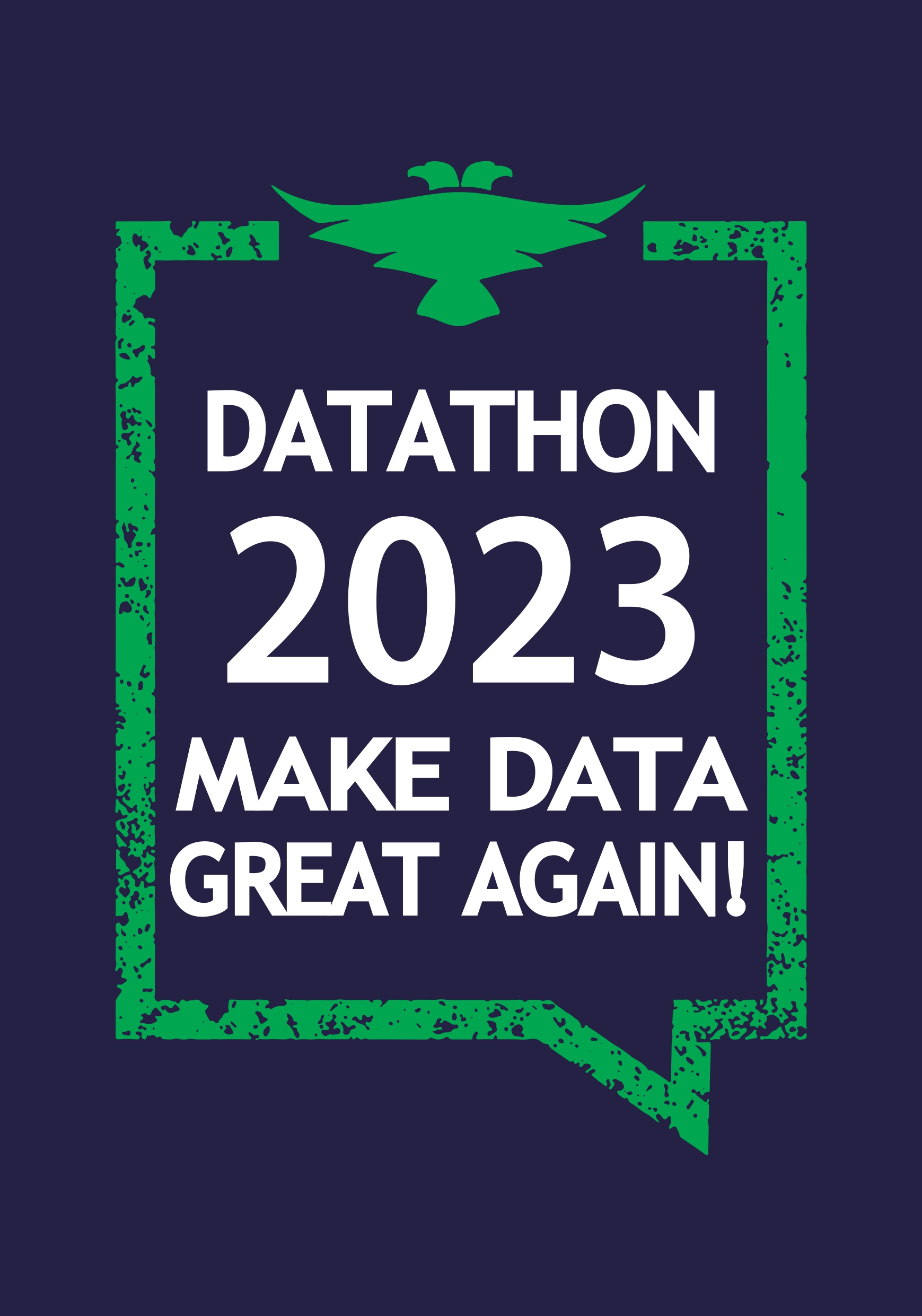
DataThon Albania, a data marathon, took place on April 3rd and 4th, 2023. Over two days, young participants collaborate to create a dataset, analyze, visualize, and present the data.
AIS has previously organized events such as Hackathons, DataThons, or DiploHacks. This year, participants in the data marathon were young members of the OpenDataFellowship Network. The event aimed at Civic Education and empowering young people in data gathering and analysis, as well as presenting their finding to the public.
Monday and Tuesday, From 3 April, 09:00 to 16:30 and 4 April, from 17:00 to 18:30
Rogner Hotel, Antigonea Meeting Room
Topic of DataThon: Party Financing Data, Charts, Visualizations and Recommendations
The participants of DataThon Albania this year are young people from the OpenDataFellowship Network
Datathon Albania 2023 is organized by AIS, promoter of Open Data in Albania
This year, DataThon is held as part of the Open Data Access and Transparency Project activities
in sectors exposed to the risk of corruption, a project financially supported by
Sida – Sweden International Development Cooperation Agency
First Day of Marathon, April 3rd, from 09:00 to 16:30
Phase 1: Ideation from 10:30 to 12:00
Welcome Participants to the Marathon
Logistics
What is a DataThon?
How can data be collected for the Finances of Political Parties over the years
Working Teams are created for Lawyers: Statisticians; Economists; and Designers
Moderator: Aranita Brahaj & Fatjona Mejdini
12:00 DEADLINE – HAND IN YOUR PROBLEM ANALYSIS
Lunch 12:00 – 13:00
Phase 2: Prototyping 13:00 to 15:00
Phase 3: Preparing an elevator pitch from 15:00 to 16:30
Prepare an elevator pitch of Max 3 minutes on the idea MAX 1 visual
17.00 DEADLINE: HAND IN 1 VISUAL FOR ELEVATOR PITCH
Second Day of the Marathon, April 4rth, from 17:00 to 18.30
DataThon Albania Award Ceremony
Tuesday, April 4th, 17:00 – 18:30
Rogner Hotel, Antigonea Meeting Room
PRESENTATION OF THE TEAMS – KEY NOTE SPEECH – AWARDS AND DRINKS
Follow us
On the website of AIS http://ais.al/new/
On twitter @AIScience
on Facebook https://www.facebook.com/OpenDataAlbania/
Where the Graph, Data and Visualizations of this Marathon are published
On the Open Data Albania web page
DataThon Albania 2023 is organized by @AIS, promoter of Open Data in Albania
Supported by Sida – Sweden International Development Cooperation Agency

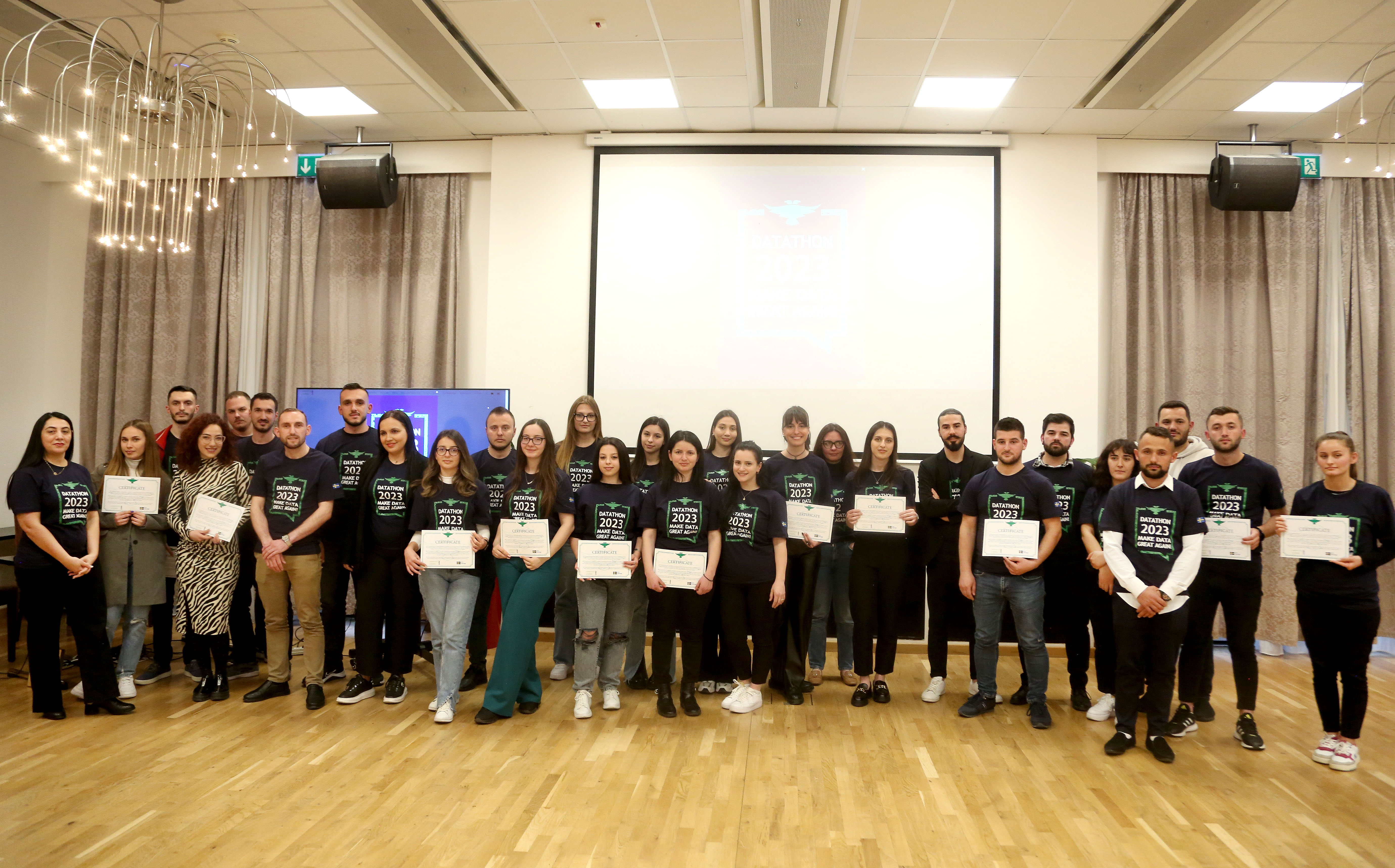
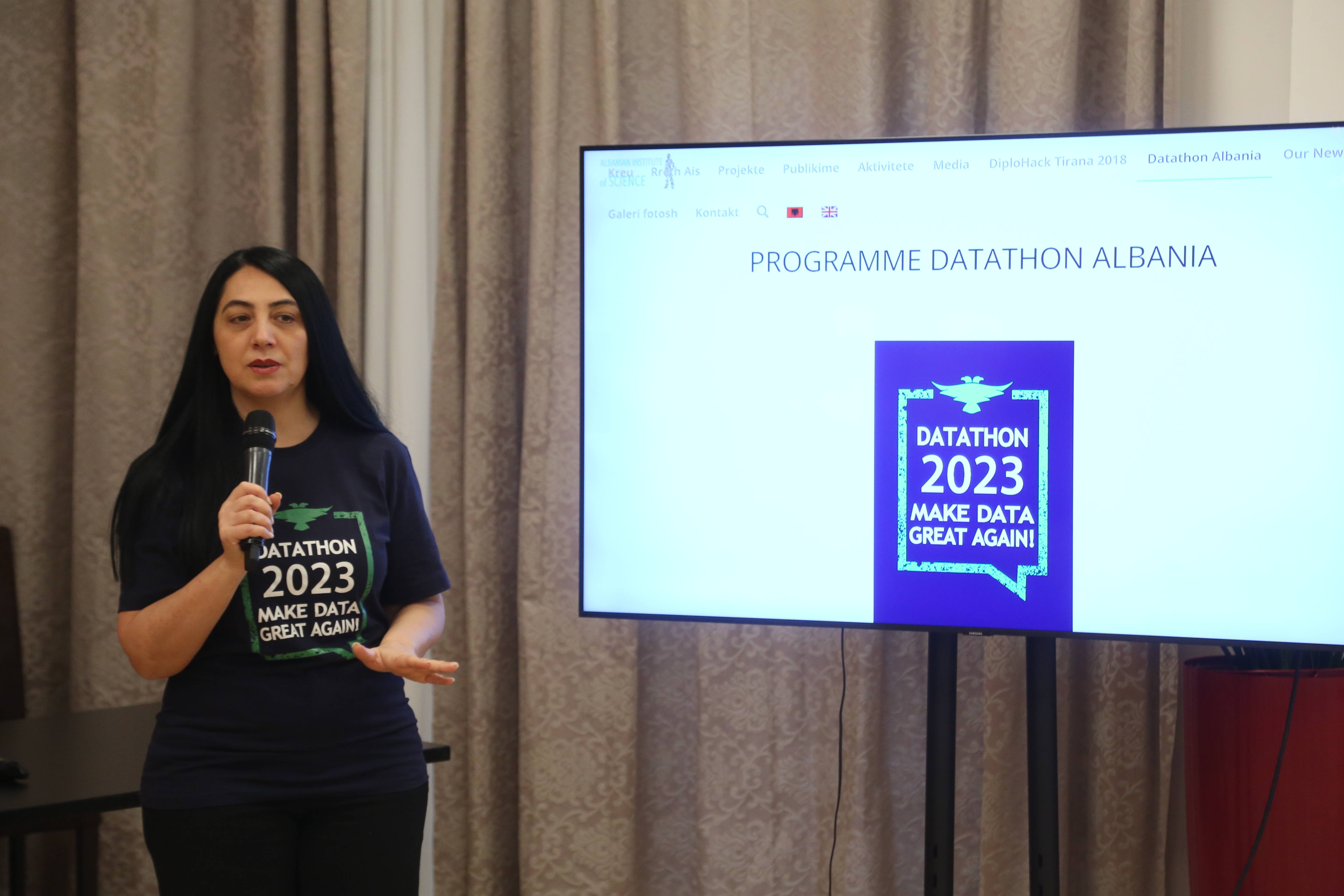
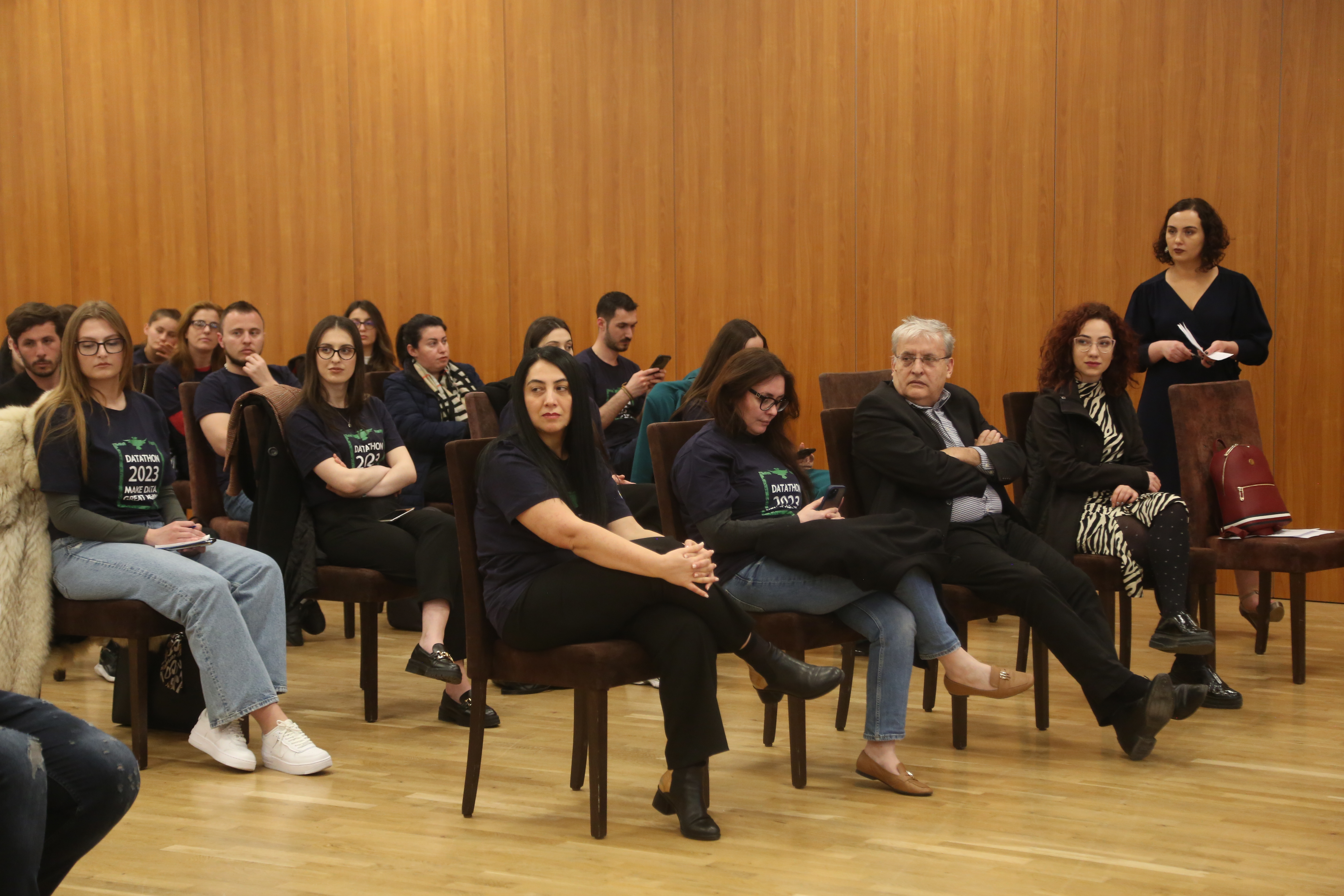
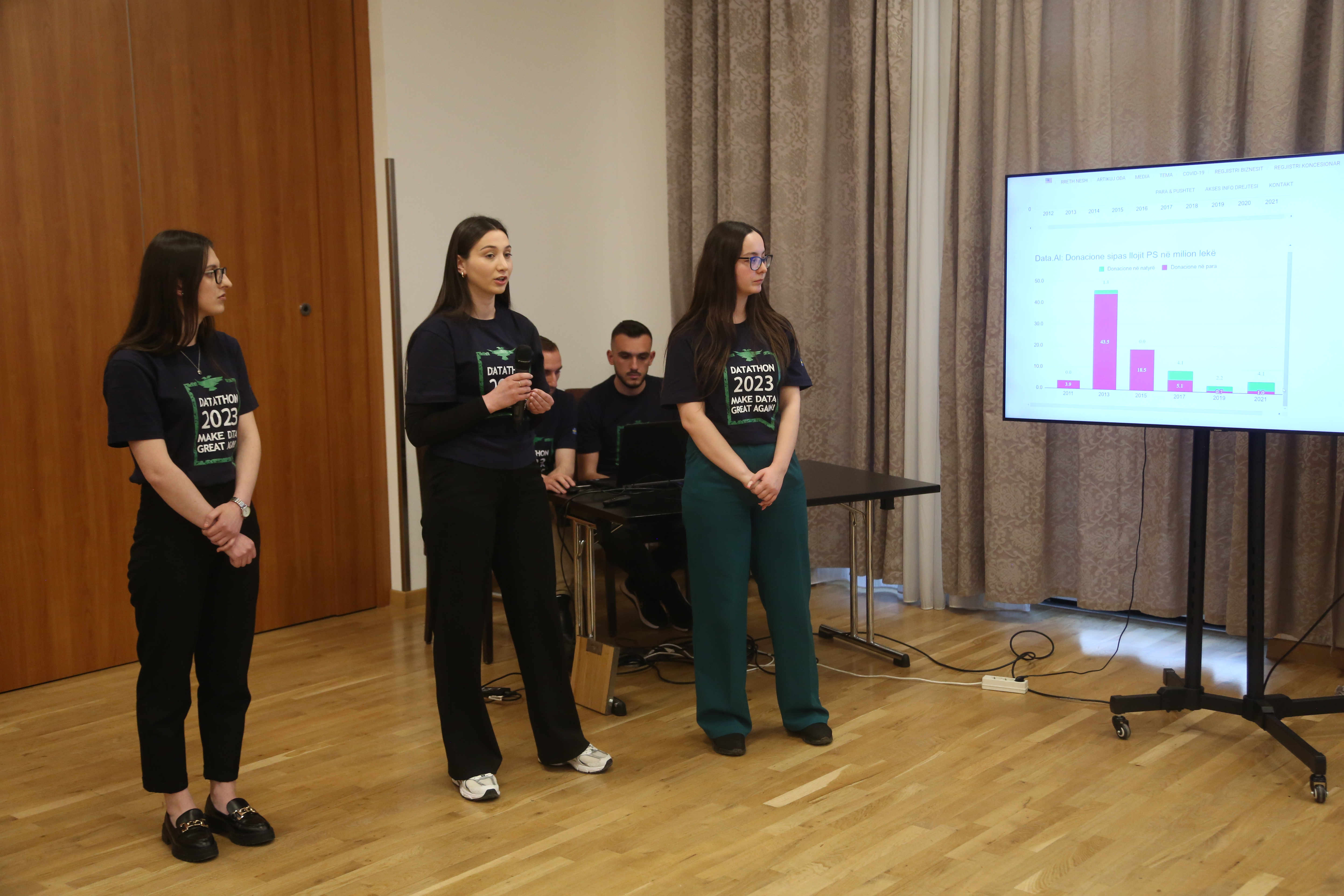
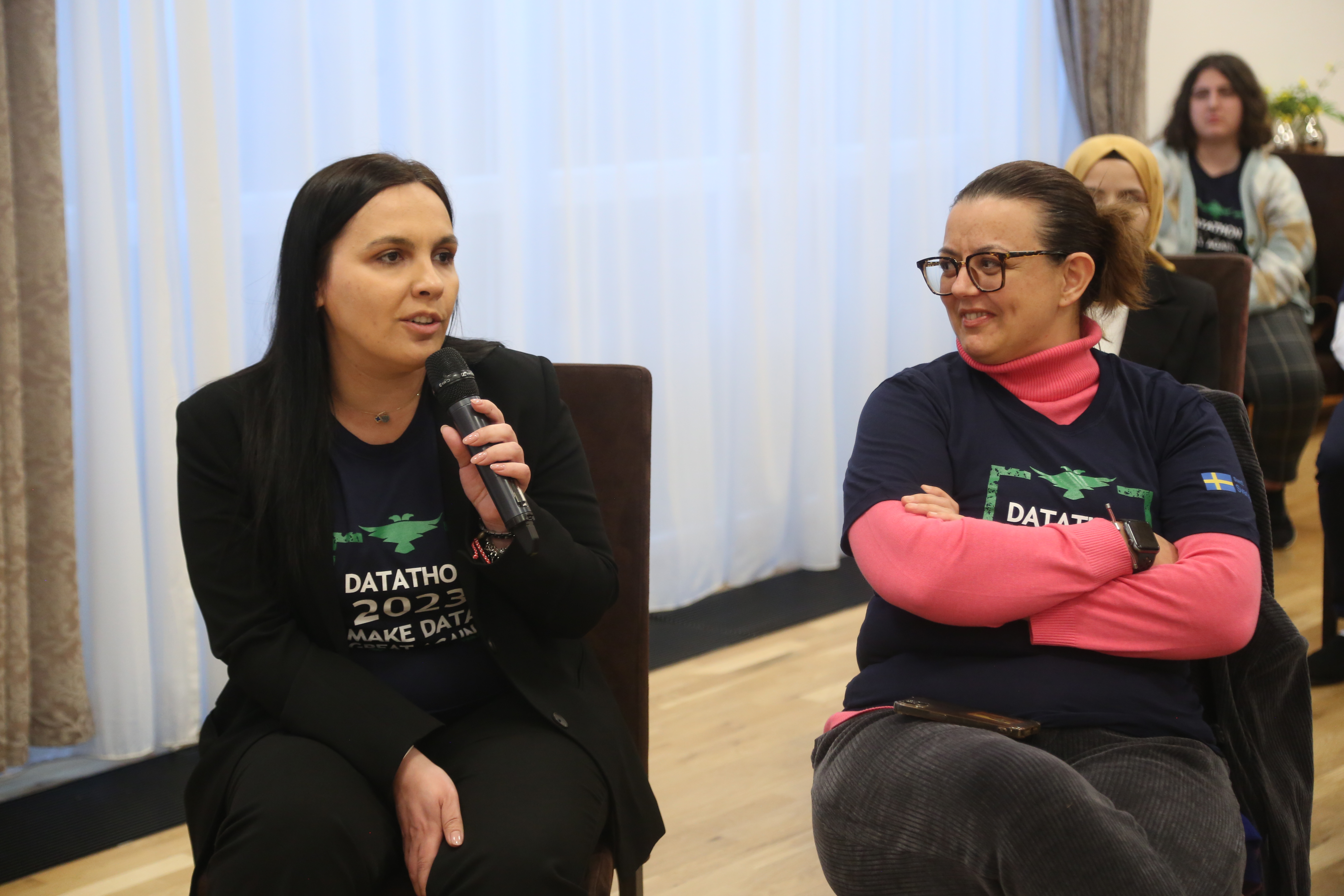
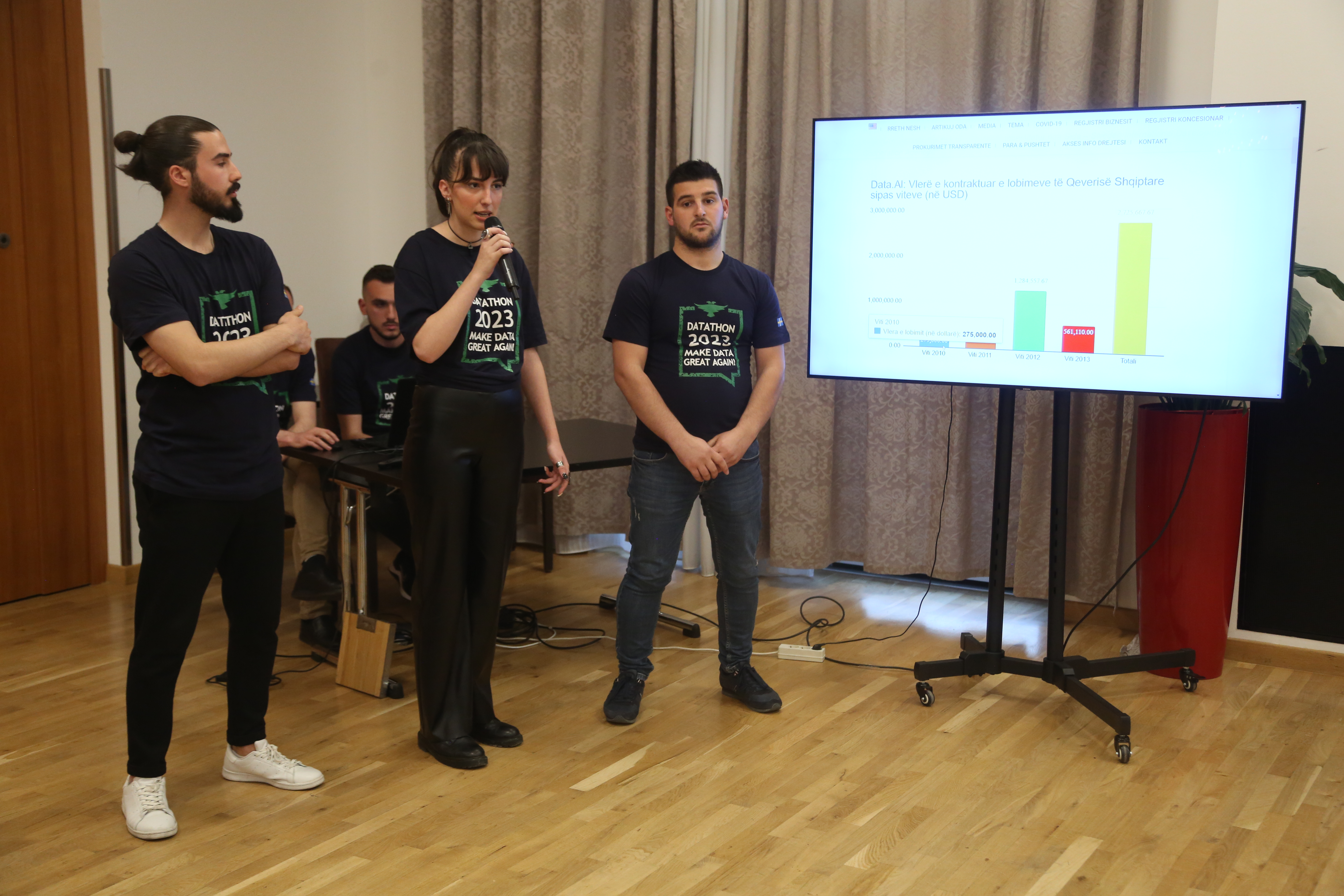
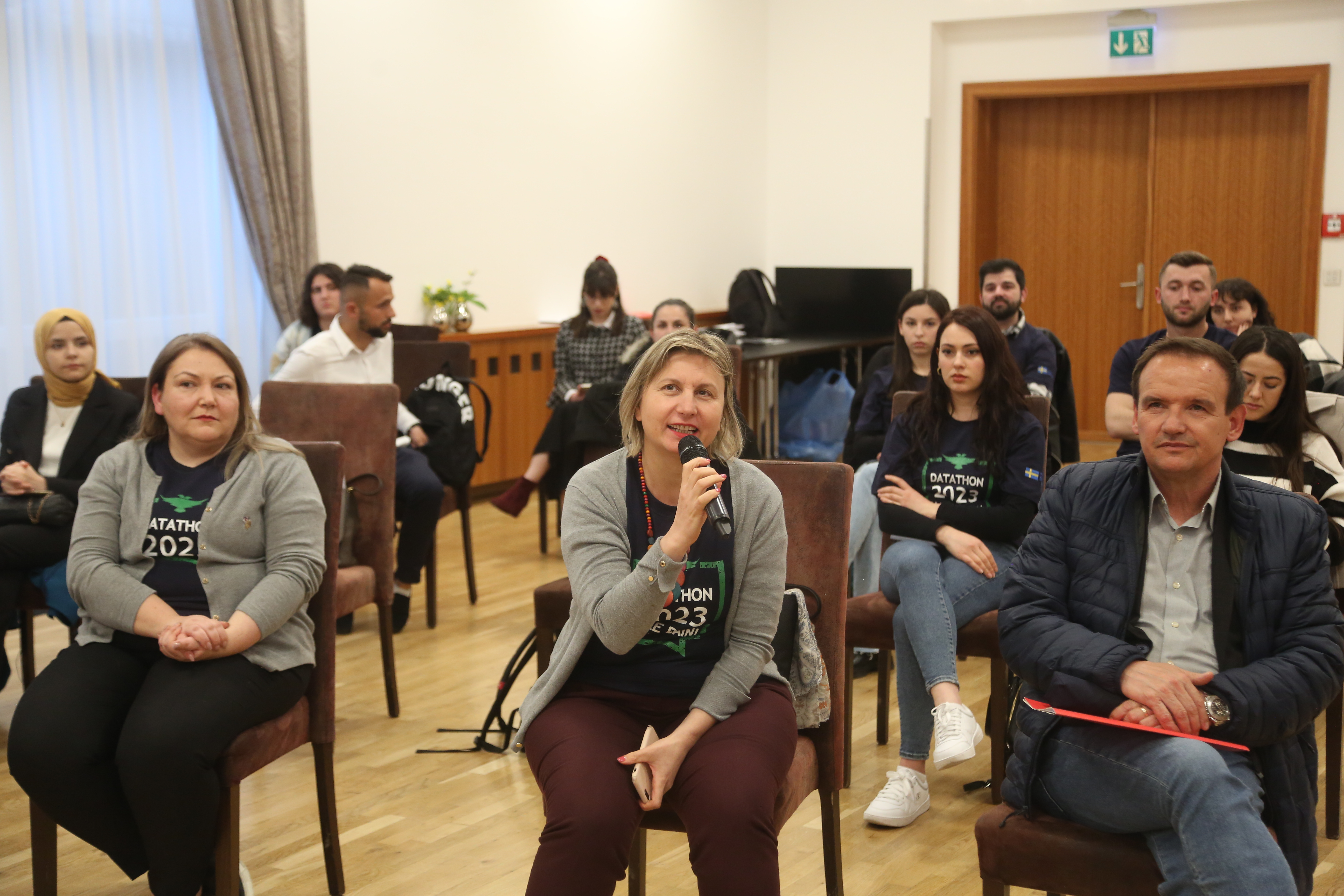
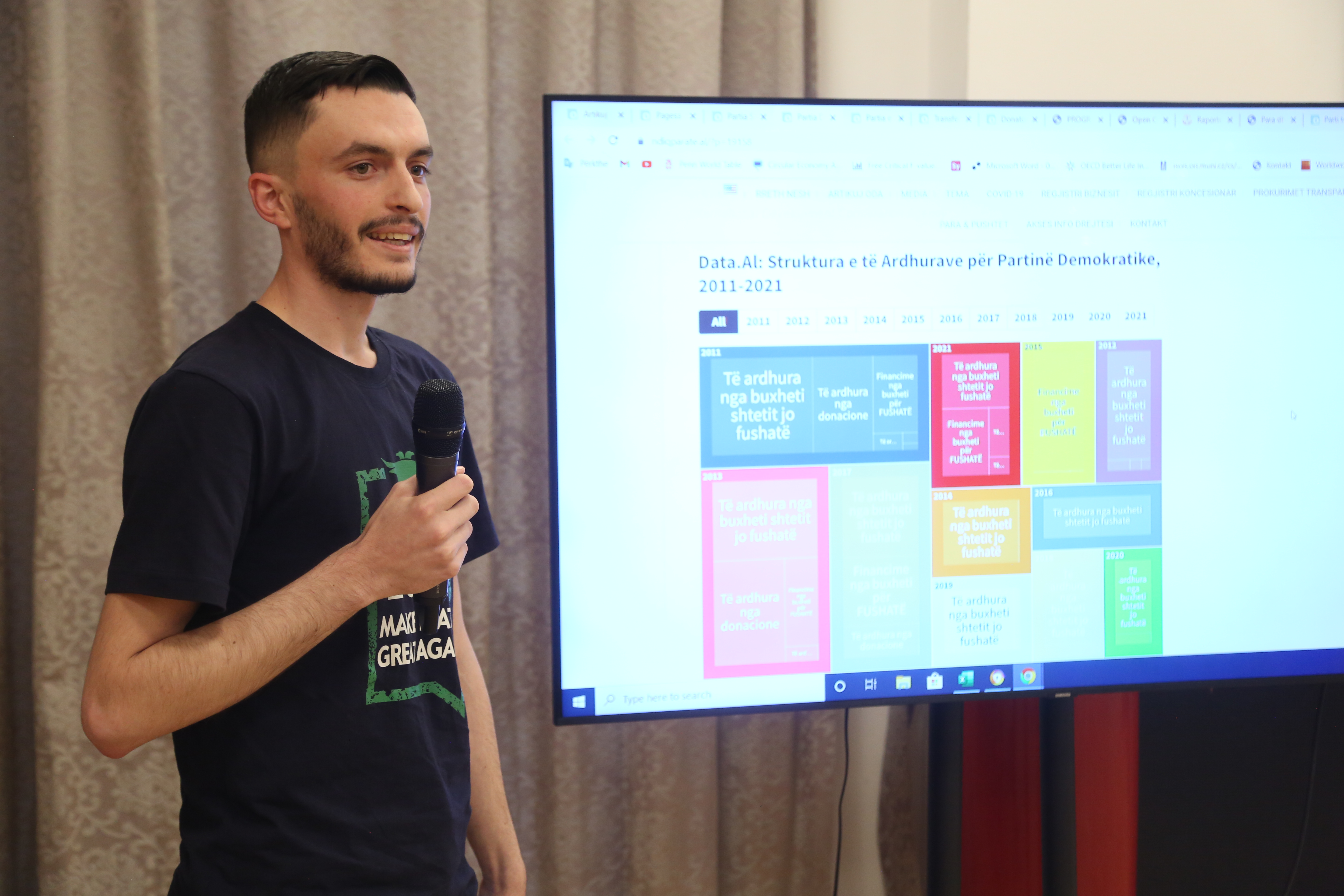
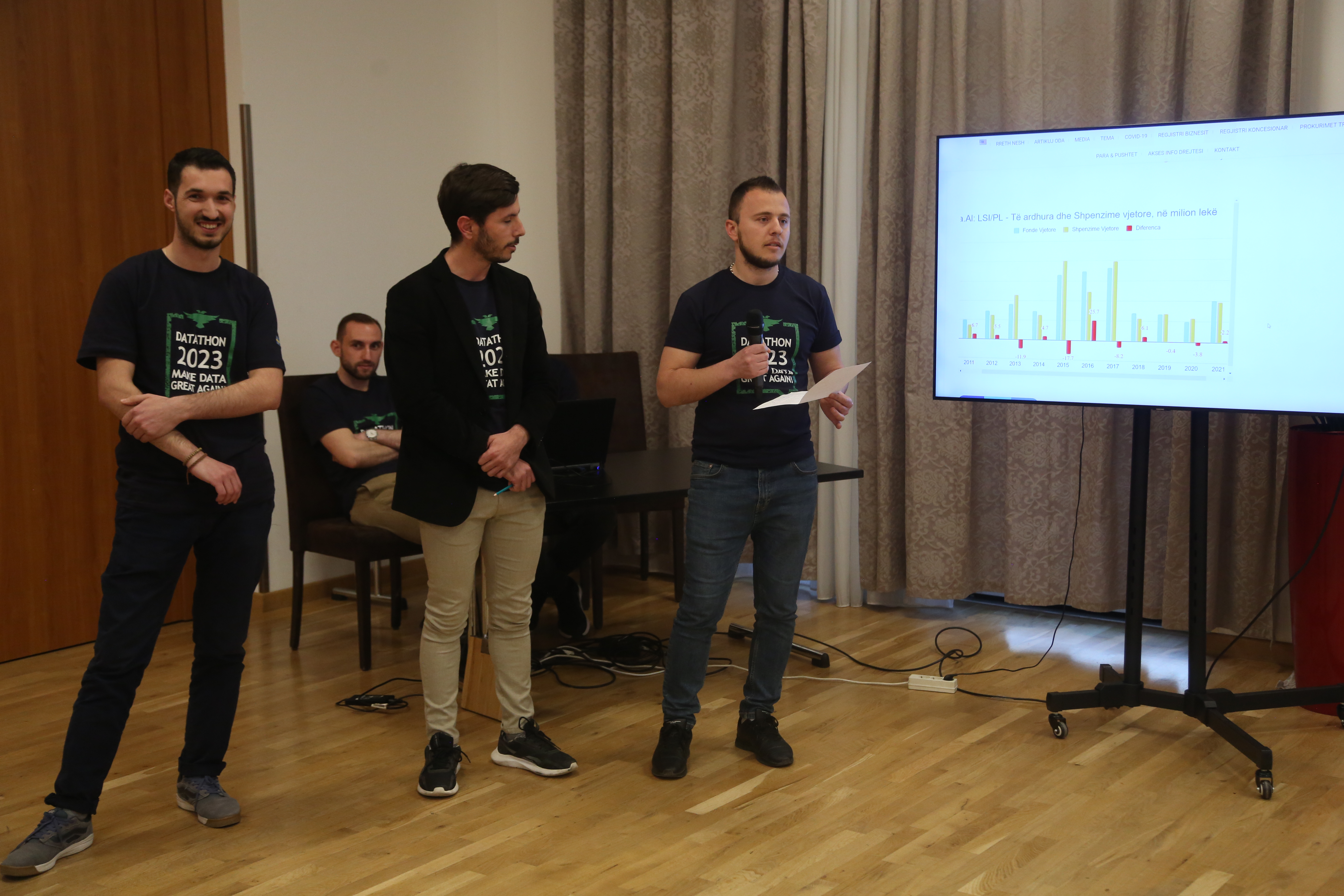
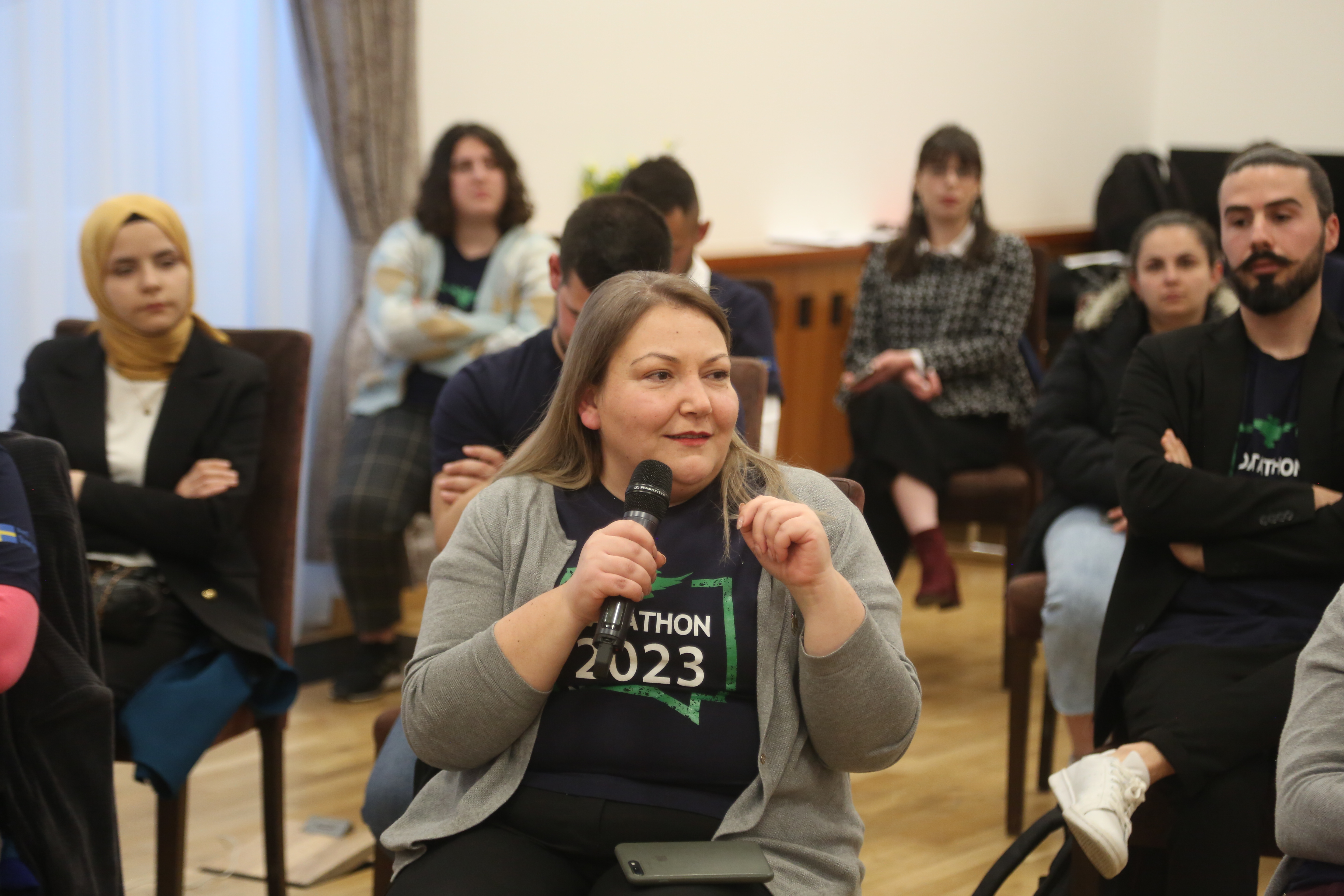
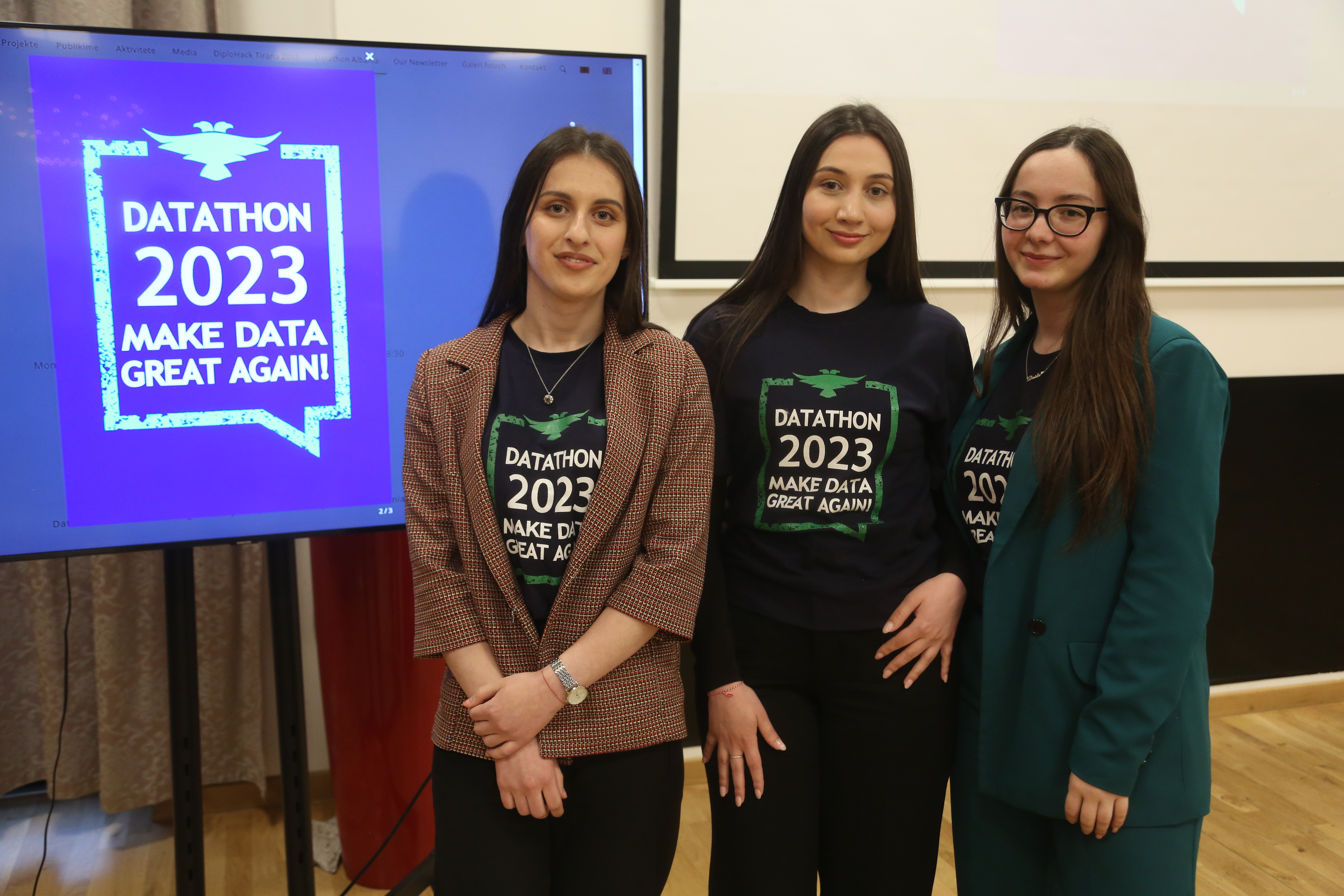
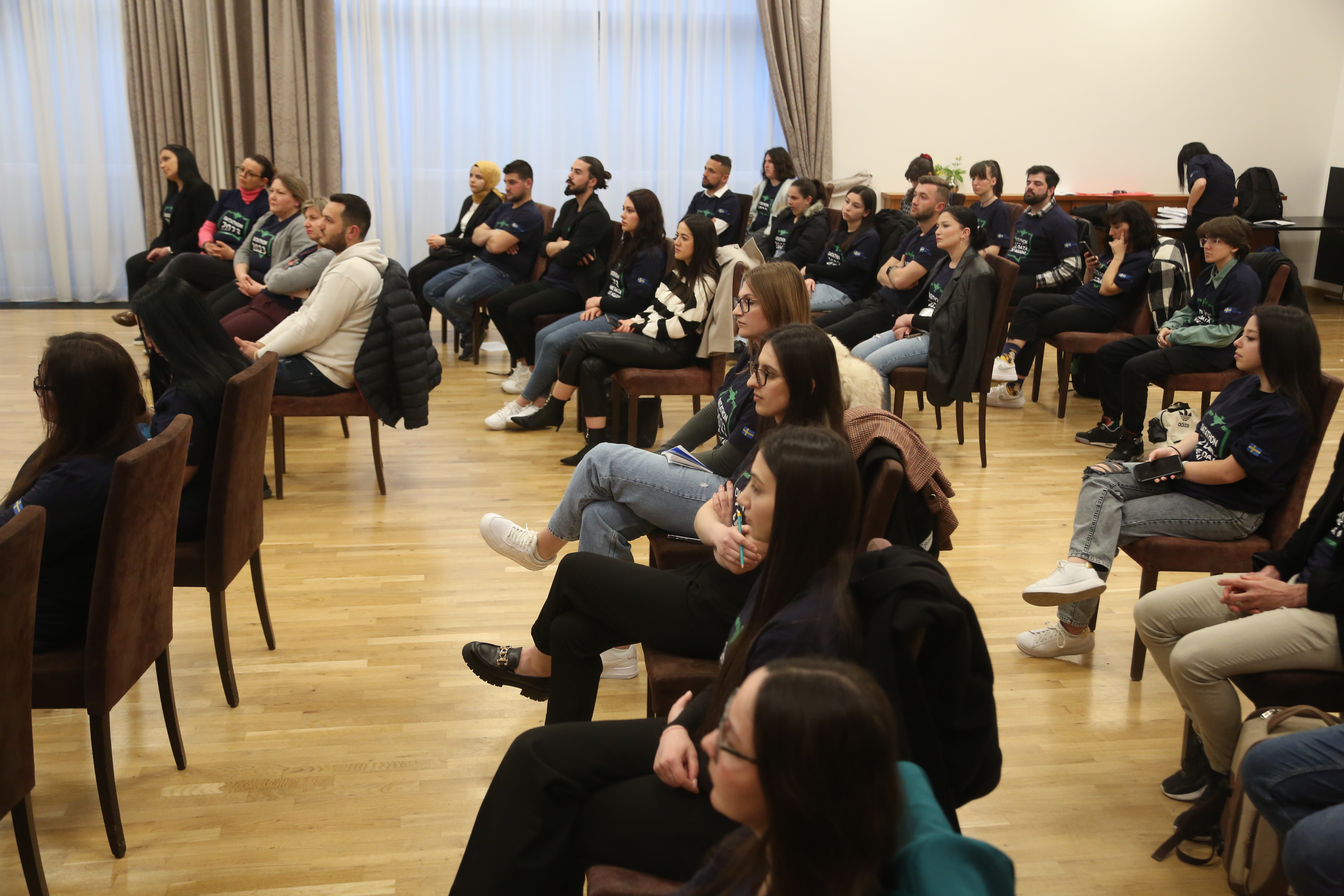
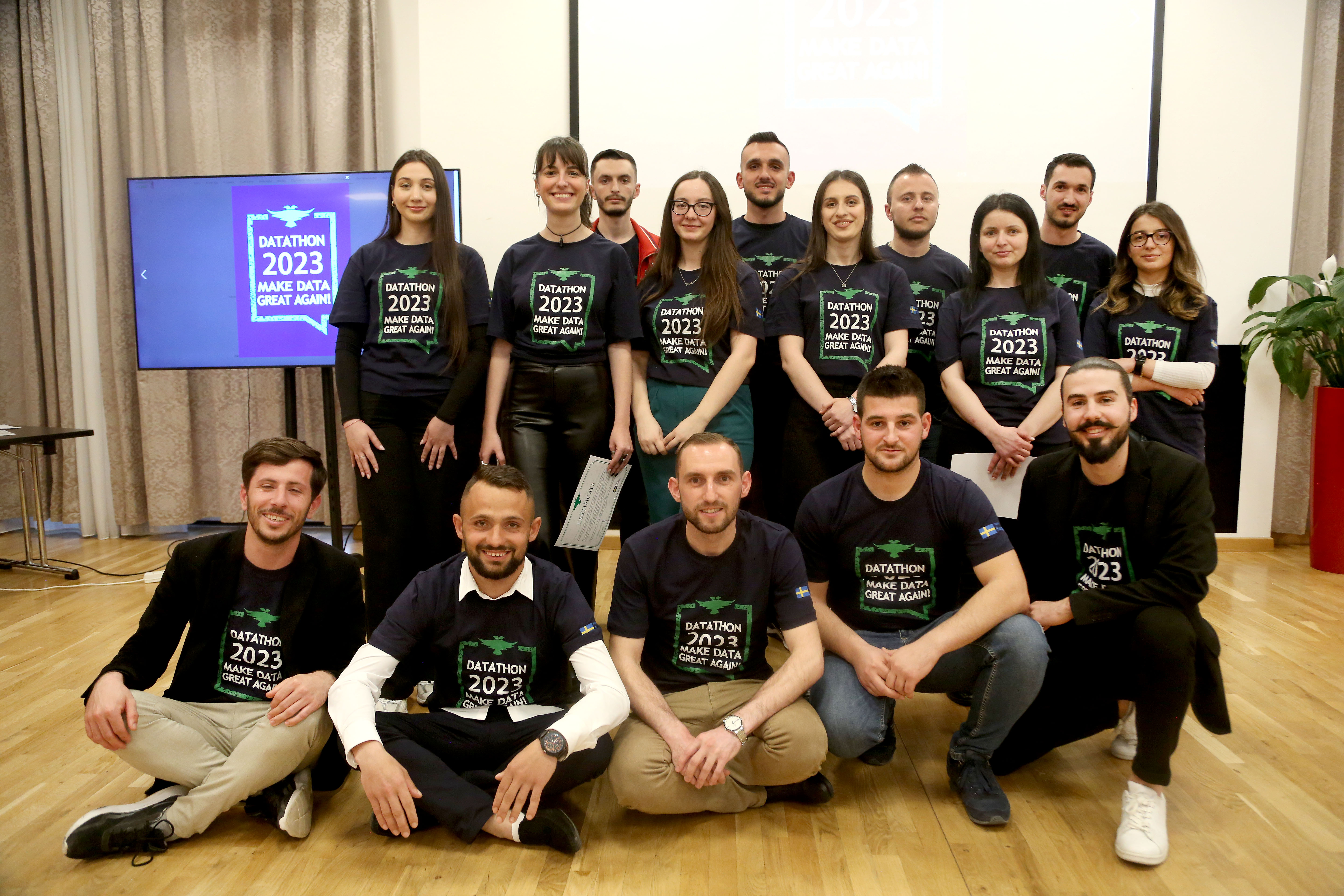
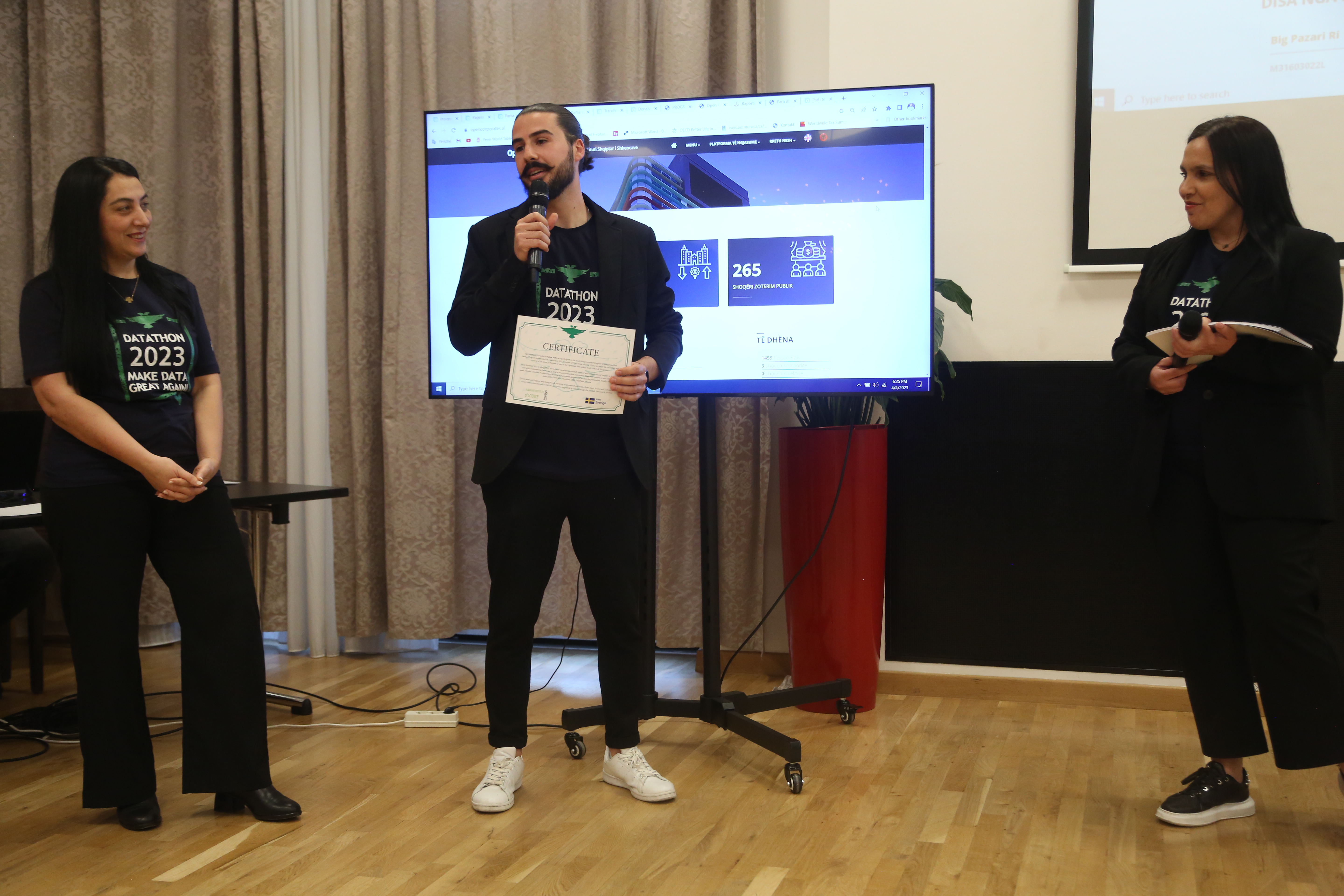
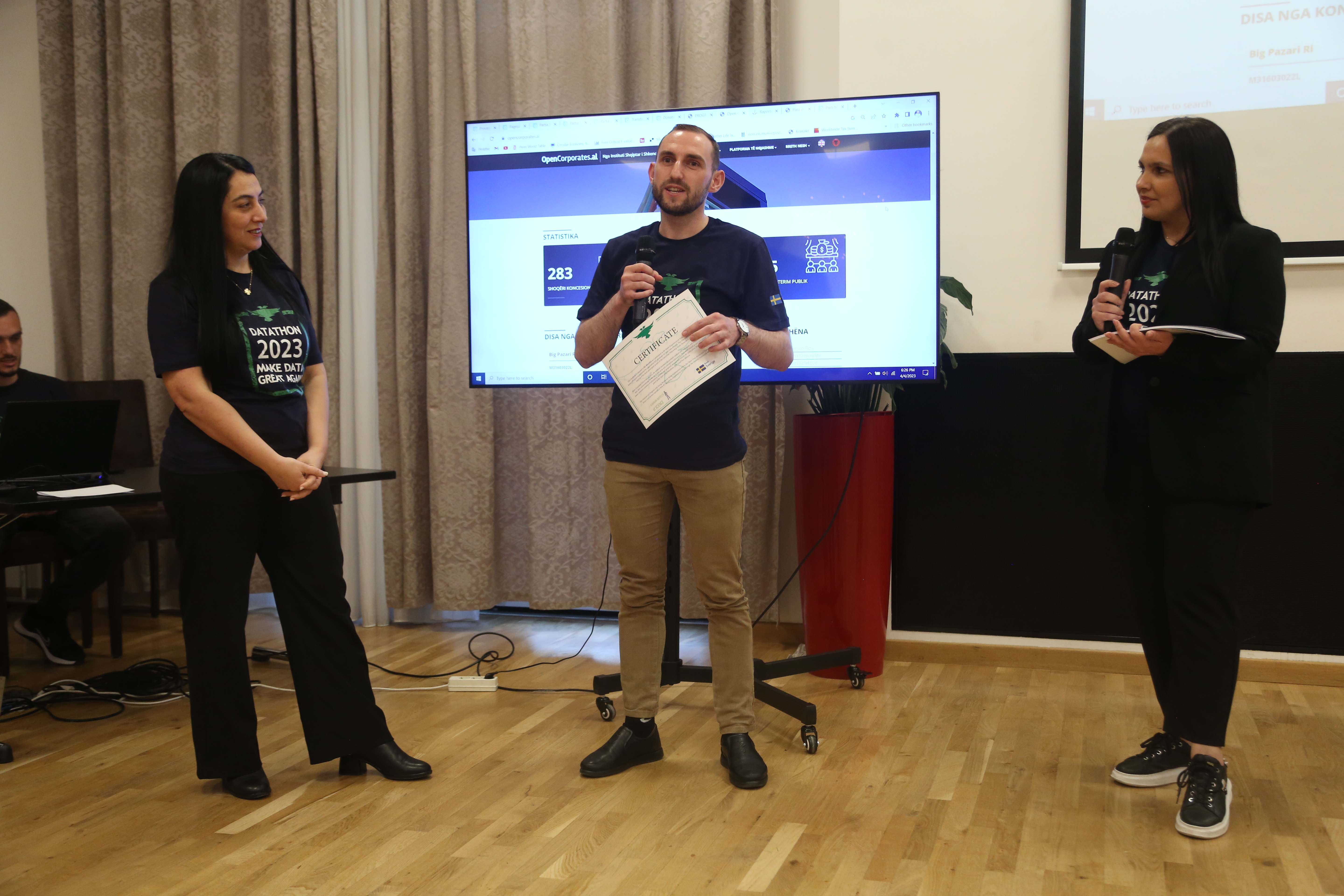
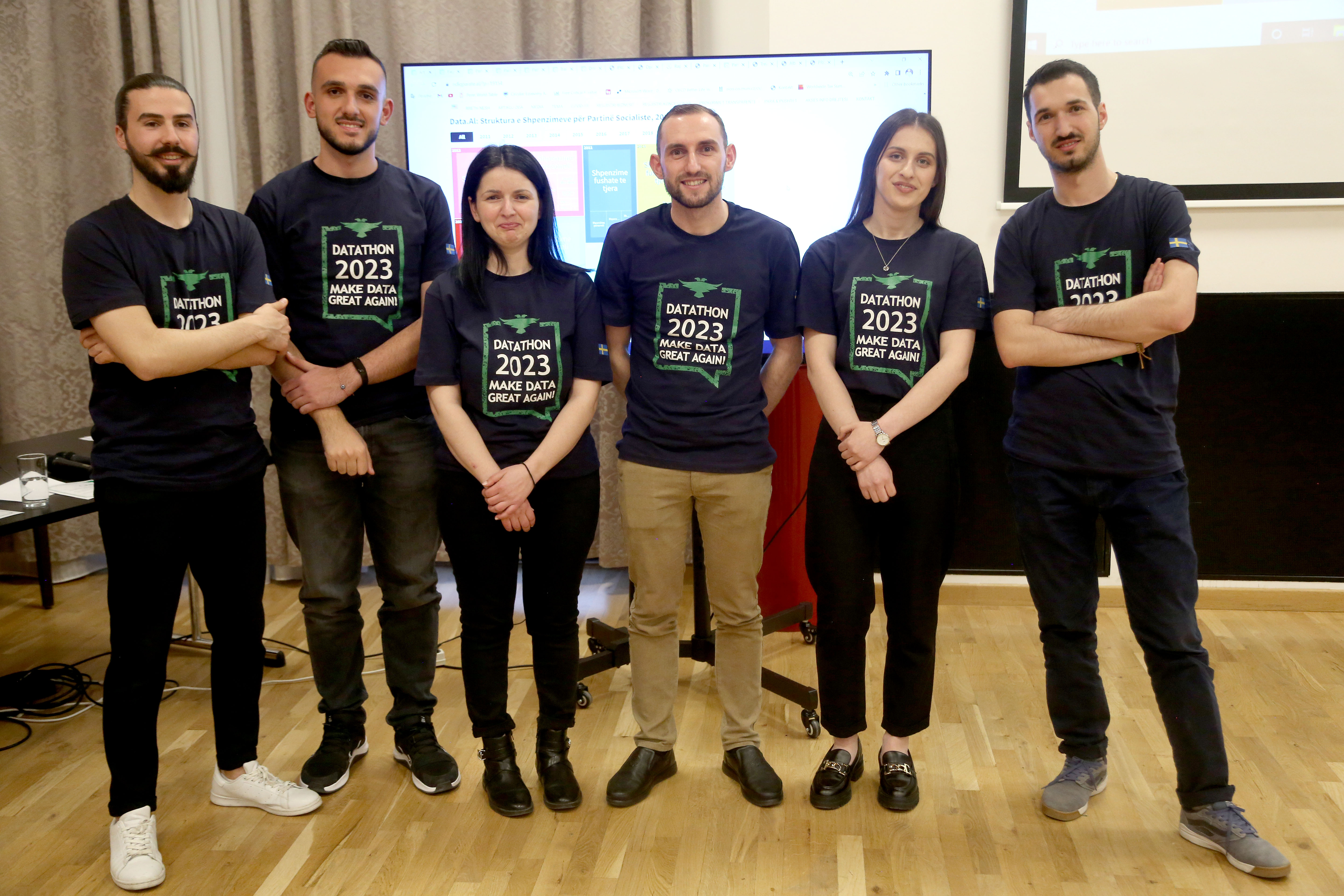
Some Data-Sets, Graf and Data prepared in the frame of the DataThon Albania 2023 event:
Comments and Recommendations on Public Consultation – Amendment to the Law on Public Procurement AIS Open Data Albania
/in Press Releases /by adminThe Albanian Institute of Science, widely recognized as the driving force behind Open Data Albania (AIS/Open Data), has undertaken a thorough review of the Draft Law proposing amendments to the existing Law on Public Procurement. Specifically, we have closely examined the Notice for Public Consultation regarding this draft law, which addresses various additions and changes to Law No. 162, dated December 23, 2020, concerning Public Procurement.
The Albanian Government introduced these Draft Amendments on June 20th, and they are currently available on its website for Public Consultation, welcoming input from relevant stakeholders.
Given our organization’s dedication to matters pertaining to the Public Procurement and Contracting sector, AIS/Open Data has previously participated in public consultations involving State Institutions engaged in this domain.
Concerning the June 2023 Draft, which has not yet been submitted to the Assembly, AIS has communicated its Comments and Recommendations (attached) in a letter to the Albanian Government Coordinator for Information. We are particularly concerned about three new developments that the proposed law seeks to integrate into the legal framework of the Public Procurement sector. These aspects and concepts have not been clearly and exhaustively addressed, thereby conflicting with the overall Legislation or the existing regulations regarding Public Procurements. The areas of concern include:
Additionally, we have evaluated the following aspects:
The proposed Draft Law seems premature; it lacks clear references to specific sections of the draft that align with EU Directives and introduces notions that are not regulated in our national legislation, lacking a foundation in proven models.
Certain provisions within the draft could potentially limit broad access to monitoring and participation in Public Procurements, thus posing a risk for regression.
The draft itself presents partial and non-exhaustive provisions for some concepts.
The explanatory report does not provide sufficient information about the underlying models and does not cite an evaluation document analysing the need for intervention.
AIS / Open Data Albania requests the Council of Ministers to withdraw the draft from the ongoing Consultation and Advancement process, returning it for further review within the Institutional Working Groups.
The Document
We have attached the letter we sent to the Coordinator of Information at the Council of Ministers, including our Comments and Recommendations for Public Consultation.
Looking ahead, in September, AIS/Open Data Albania will be organizing an event focused on the Need for Improvements in the Legislation of Public Procurements.
We highly value your attention, cooperation, and active participation in this essential matter.
Save the date: Open Data Youth Fellowship Master Class on Enhancing Electoral Integrity through Data and Evidence-Based Approaches
/in Press Releases /by adminDear friends,
We would like to share with you an invitation to participate in a Master Class Event where Data Analysts and activists who have completed the first cycle of training as part of the Open Data Youth Fellowship and Network will share with new members of the Network evidence, analysis and activities on Electoral Integrity, improvement through data and evidence-based processes.
This event is part of activities for increasing the capacities of young people, through The OpenDataFellowship Youth Network, established within the Open Data, Access and Transparency over Sectors exposed to Risk of Corruption Project, supported by Sida through the Swedish Embassy in Albania (2021 – February 2024).
The participants of the first round of the Open Data Fellowship Youth Network (2021 – April 2023) will showcase data, visualizations, articles, and opinions related to electoral issues, focusing on the intricacies of the Electoral System and the Map of Problems and Irregularities.
Speakers:
Our organization, AIS, has been working with young people since December 2021 to strengthen their capacity against corruption through civic education and the improvement of fact-checking models. Events such as training sessions, forums, DataThons, individual sessions, and master classes are organized for young people, aimed at enhancing their skills and capacities in areas such as Public Speaking, Evidence-based Debates, and utilizing Open Data Albania’s philosophy and tools. The program follows a structured training curriculum and includes guidance from analysts at Open Data Albania, as well as opportunities for internships with the organization.
The Open Data Fellowship Youth Network is being established within the Open Data, Access and Transparency over Sectors exposed to Risk of Corruption Project supported by Sida through the Swedish Embassy in Albania.
Save the date for this important event: July 3rd, from 14:00 to 17:00, at Hotel Rogner Tirana. We kindly request you to confirm your participation no later than June 26th.
The event will be conducted in both Albanian and English, and simultaneous interpretation services will be provided by Mrs. Etleva Pushi.
The need for Electoral Reform. A Projection on the Distribution of 2025 MP Mandates based on the May 2023 votes shows defects in representation
/in Press Releases /by adminDear Ladies,
Dear Gentlemen,
AIS, the organization promoting Open Data Albania, has just published a Projection of how mandates for MPs would be distributed in the 2025 parliamentary elections, if the electoral subjects would run with the Current Electoral Code applied, and secure as many votes as in the May 14 Elections (votes for the representation of the Subjects in the Municipal Councils).
This projection brings evidence of the distortions of the Electoral Will and non-compliance with the Principle of Representation.
The Current System (Regional Competition) creates Non-Representation even at the expense of small or new parties. The Projection based on the results of May 2023, includes 282,850 Votes of these Parties that are not translated into Mandate, that is, they do not produce any MP mandates at all. This number of votes of the Parties that cannot reach the Parliament, is as much as 21% of the voters in the latest process.
The Current Code, with the results of May 14 and with the same subjects participating in the Election (40 parties), would give the Main Party with 84 Mandates, 10 more than in the 2021 Elections (with 12 electoral subjects running).
The paradox is that this Party would manage to get 3/5ths of the Parliamentiary seats, although in the electoral process it received 188,558 less votes (in 2021, 768,134 votes, while in the May 14 election process, this electoral subject managed to receive 579 576 votes or minus 24.5%) for the municipality councils.
As it is clearly seen from this Projection, the ratio between Votes per Subject and MP Mandates is applied as an Indirect Ratio in the case of the Main Party: Less Voters and More MP Mandates.
See the published report and evidence LINK Projection of Mandate distribution for MPs in the 2025 elections based on data results for Subjects of the May 14 Electoral Process – Open Data Albania (ndiqparate.al)
If the latest elections of May 14th were parliamentary elections, and if the same formula and legal provision of Article 162 of the Electoral Code (in force) were applied for allocating the parliamentary seats, the allocation would be as follows: Socialist Party 84; Together We Win 34; The Official Democratic Party only 11; The Social Democratic Party led by Tom Doshi 9 mandates; The Agrarian Environmentalist Party led by Agron Duka 2 mandates.
What if a National Competition System was applied. If we compare the same vote result as translated into Mandates for Subjects if the country would apply a National Electoral system where Specifically:
– If the SP would receive 579,576 votes, but the country would have a National, and not a Regional Competition system, the SP would receive only 67 MPs. So less than 50% of the number of MPs in the Assembly.
Based on the above, AIS / Open Data Albania expresses its concern that this System does not guarantee Fair Representation and respect for the Vote, discriminating also against New Alternatives.
We emphasize the need for Electoral Reform where the Parliament commits to a Fairer Electoral System, where the will of the voters is also guaranteed.
The Analysis and the Report are part of the publications in the Open Data Albania Database.
We remain open to questions and committed to deepen our evidence-based analysis.
Tenders in the healthcare sector, 40% of procedures carry risk of clientelism, marked with a red flag
/in Homeposts, Press Releases /by adminThe apprehension, on corruption charges, of a senior official from the Ministry of Health coincides with grim developments in this sector’s public contracting
AIS, through its Open Procurement Albania database – the Health category, has been monitoring all relevant procurement procedures for years, assessing and marking with a Red Flag (risk of irregularities and clientelism) several of them, which exhibited clear markers of abuse.
Link Database
Link Red Flag listing (risk for clientelism and irregularities)
Indeed, Health constitutes a sector, in which the Red Flag Tenders to the Total Tenders Ratio exceeds 40% of cases (in the case of municipalities, this indicator ranges from 15 to 25%).
However, the phenomenon of deterring officials only in flagrant cases of bribery, does very little to minimize corruption in the public procurement. The analysis, investigation or audit of risky procedures would lead to a better distribution of public money in this sector, which affects and has the potential, to further make the lives of patients in the health system, more vulnerable.
List of tenders of the Ministry of Health for which the Ministry has not yet announced the winner.
Debate and Policy Paper on “Financial Control of State-Owned Corporates” (Standards, Chapter 32 of EU Integration)
/in Publications /by adminThe organization AIS, promoter of Open Data Albania, organized on May 31st, a Debate and Presentation of a Policy Paper on the topic of Financial Control of State-Owned Corporates (SOC – State Owned Corporates).
Financial Control, as in chapter 32, part of Cluster 1, in the process of fulfilling the conditions and standards for Integration.
State Owned Enterprises or Companies are a risky sector in terms of management and control of finances and assets. The Integration Process targets efforts and models which in the SOC sector are far from meritocracy management, effective performance, sound financial management and multi-level auditing.
The Policy Paper, drafted by AIS, was presented by the expert Professor Dr. Lindita Milo (Lati). The document analyzes the situation in the country and presents findings and recommendations for progress. This document was formulated as part of the C1-EU-NPA project, supported by the Embassy of the Kingdom of the Netherlands in Tirana.
The complete document in Albanian and English.
51 Parties have benefited ALL 2.17 billion from Taxpayers in 10 years 2011-2022
/in Events /by admin- In ten years, 2012-2021, Political Parties have benefited from public funding in the amount of 2.174 billion ALL.
- ALL 1.784 billion are allocated to the regular annual activity of political parties, while ALL 390 million have been allocated to electoral campaigns (General Election 2013, Local Election 2015, General Election 2017, Local Election 2019, and General Election 2021).
- Budget expenditures as support for Political Parties for their Election Campaigns have been in the amount of 65 million ALL until 2021, while this year these transfers have doubled to 130 million ALL.
- Public financing for electoral campaigns for Political Parties accounted for about 20-27% of the total public financing for parties during the years 2013, 2015, 2017 and 2019, while in 2021 it accounted for almost half or 47%.
- On average, in an electoral year, 265 million ALL were transferred from the State Budget as support for political parties, while in non-electoral years, 170 million ALL or 36% less were allocated to the parties.
- Treasury data show that over the years the Socialist Party is the one that has benefited from the highest value of transfers from the State Budget. The years 2012 and 2014, on the other hand, are the years when it was the Democratic Party the one that has benefited the most from public funds.
- In total, there are 50 political parties that have managed to absorb funding from the State Budget in the years 2012-2021. In 2022, even Nisma Thurje Party managed to get funds from the state budget, bringing the number of political parties benefiting from transfers from the state treasury to 51 parties.
Open Data Albania, the database owned by AIS, has disclosed year after year data on the funding and costs of election campaigns and political parties. You can read a group of articles in the Electoral Expenses section or in the Electoral Processes section. Being committed to contributing to transparency and improvement of electoral situations, AIS has developed methodologies and projects for Election Citizen Monitoring. The organization is already working on raising funds for such methodologies and projects to be implemented in the upcoming 2025 parliamentary elections.Debate and Policy Paper on “Financial Control of State-Owned Corporates” (Standards, Chapter 32 of EU Integration)
/in Events, Homeposts, Press Releases /by adminThe organization AIS, promoter of Open Data Albania, organized on May 31st, a Debate and Presentation of a Policy Paper on the topic of Financial Control of State-Owned Corporates (SOC – State Owned Corporates).
Financial Control, as in chapter 32, part of Cluster 1, in the process of fulfilling the conditions and standards for Integration.
State Owned Enterprises or Companies are a risky sector in terms of management and control of finances and assets. The Integration Process targets efforts and models which in the SOC sector are far from meritocracy management, effective performance, sound financial management and multi-level auditing.
The Policy Paper, drafted by AIS, was presented by the expert Professor Dr. Lindita Milo (Lati). The document analyzes the situation in the country and presents findings and recommendations for progress. This document was formulated as part of the C1-EU-NPA project, supported by the Embassy of the Kingdom of the Netherlands in Tirana.
The complete document in Albanian and English.
Three expert panelists ellaborated and emphasized aspects of the sector, problems and the need for better standards and policies in management and auditing. Specifically:
Prof. Assoc. Dr. Ira GJIKA presented the Findings and Recommendations on Enterprise Management and Auditing
CFA. Irena BEQIRAJ The former Deputy Minister of Finances, presented some typical cases of poor SOC management, issues coming from party influences and the lack of meritocracy at the management level.
Prof. Assoc. Dr. Mateo SPAHO presented the EU models and standards of Financial Control over State Owned Companies, highlighting a far-from-positive situation in the Albanian context and the need for reform, independence and management through administrators with the proper skills and integrity.
At this event, the DataSet with dynamic passports for State Owned Corporates was also presented, a dataset incorporated in the Open Corporates Albania web database. The Director of AIS/Open Data Albania, Ms. Aranita BRAHAJ, explained the importance of information and transparency on the management, performance, legal issues and use of assets of important public companies. With a view to making these companies as transparent as possible, AIS has applied the Open Corporates Albania Open Business Register model. In this database, the information comes for each Company in a well-structured version applying OpenData and LinkData standards. The database for State Owned Companies is the result of the implementation of the project entitled Open Data Access and Transparency over sector exposed to Risk of Corruption, a project supported by Sida, the Sweden International Development Cooperation Agency (March 2021 – February 2024). The purpose of the project itself is to Promote Transparency and Inform the Public through Open Data.
The event was attended by representatives from Institutions Engaged in Financial Control and Auditing of the State Owned Companies Sector, such as
List of participants.
Findings, Opinions or Recommendations Expressed in this document and in the organized event represent the views of the experts and the AIS organization, and do not necessarily correspond with those of the project partners or supporters.
Datathon Albania 2023
/in Events, Homeposts, Press Releases /by adminDataThon Albania, a data marathon, took place on April 3rd and 4th, 2023. Over two days, young participants collaborate to create a dataset, analyze, visualize, and present the data.
AIS has previously organized events such as Hackathons, DataThons, or DiploHacks. This year, participants in the data marathon were young members of the OpenDataFellowship Network. The event aimed at Civic Education and empowering young people in data gathering and analysis, as well as presenting their finding to the public.
Monday and Tuesday, From 3 April, 09:00 to 16:30 and 4 April, from 17:00 to 18:30
Rogner Hotel, Antigonea Meeting Room
Topic of DataThon: Party Financing Data, Charts, Visualizations and Recommendations
The participants of DataThon Albania this year are young people from the OpenDataFellowship Network
Datathon Albania 2023 is organized by AIS, promoter of Open Data in Albania
This year, DataThon is held as part of the Open Data Access and Transparency Project activities
in sectors exposed to the risk of corruption, a project financially supported by
Sida – Sweden International Development Cooperation Agency
First Day of Marathon, April 3rd, from 09:00 to 16:30
Phase 1: Ideation from 10:30 to 12:00
Welcome Participants to the Marathon
Logistics
What is a DataThon?
How can data be collected for the Finances of Political Parties over the years
Working Teams are created for Lawyers: Statisticians; Economists; and Designers
Moderator: Aranita Brahaj & Fatjona Mejdini
12:00 DEADLINE – HAND IN YOUR PROBLEM ANALYSIS
Lunch 12:00 – 13:00
Phase 2: Prototyping 13:00 to 15:00
Phase 3: Preparing an elevator pitch from 15:00 to 16:30
Prepare an elevator pitch of Max 3 minutes on the idea MAX 1 visual
17.00 DEADLINE: HAND IN 1 VISUAL FOR ELEVATOR PITCH
Second Day of the Marathon, April 4rth, from 17:00 to 18.30
DataThon Albania Award Ceremony
Tuesday, April 4th, 17:00 – 18:30
Rogner Hotel, Antigonea Meeting Room
PRESENTATION OF THE TEAMS – KEY NOTE SPEECH – AWARDS AND DRINKS
Follow us
On the website of AIS http://ais.al/new/
On twitter @AIScience
on Facebook https://www.facebook.com/OpenDataAlbania/
Where the Graph, Data and Visualizations of this Marathon are published
On the Open Data Albania web page
DataThon Albania 2023 is organized by @AIS, promoter of Open Data in Albania
Supported by Sida – Sweden International Development Cooperation Agency
Some Data-Sets, Graf and Data prepared in the frame of the DataThon Albania 2023 event:
AIS concerned: Central Election Commission has limited access to Documents and Information on previous Election Periods.
/in Press Releases /by adminFor many weeks now (February 2023), the CEC official website lost touch with its database before 2020. This database contains Documents, Acts, Reports, Minutes and Decisions that represent the backbone of CEC activity and electoral campaigns developments. Similarly, while Albania gears up for the local elections, the previous 2019 campaign is darkened by a total lack of acts and information on the CEC website.
Although public access to these documents is a legal obligation, those are no longer accessible online for use by interested stakeholders. Specifically, missing from the pre-2020 campaigns are all:
While CEC proclaimed initiatives to apply information technology, digitalization, and online reporting during 2023, it seems that website hosting and interoperability with the earlier database is a challenge that puts a big question mark on CEC’s capacities and will.
AIS is an organization that promotes access, transparency, and information. AIS holds that Data is Power and data must be made available to all stakeholders.
AIS filed a complaint on this denied access in the section Report of CEC website, and finds really concerning this shrank access to information on previous electoral campaigns and developments.
Truncated access, missing transparency, and irresponsibility in managing official documents represent a very risky aspect of how access to information may be used unilaterally.
DataThon Albania 2023 – Topic Party Financing Data, Charts, Visualizations and Recommendations
/in Events, Homeposts /by adminMake Data Great Again
What is DataThon Albania 2023
DataThon is a marathon event where citizens work together to collect, analyze data and raise awareness about a specific topic. The word DataThon is a combination of Data plus Marathon. The work consists of data collection, analysis, comparison, structuring and visualization of information.
Usually, a specific topic or field is chosen and the engaged group focuses and has an interest in working in that field.
Instruments or apps are often developed in datathons to make the information as useful as possible. DataThon are events where citizens, activists, journalists, economists, lawyers, architects, and various professionals may participate as long as they have a passion and desire to work with data.
An inspiring event for DataThon Albania 2023 is also the EU DataThon
Who Organizes DataThon Albania 2023
Datathon Albania 2023 is organized by AIS, promoter of Open Data in Albania. AIS has previously brought events like DiploHack Tirana, Hackathon and DataThon.
This year, DataThon is held as part of the Activities of the Project Open Data Access and Transparency in the sector at risk of corruption, a project financially supported by Sida – Sweden International Development Cooperation Agency.
Where and when it will be held
April 3 and 4, 2023 at Antigonea Meeting Room, Rogner Hotel
Who will work on the data? What about the audience
This year, participants of DataThon Albania are young people from the OpenDataFellowship Network. This Youth Network was created to increase the capacities and skills of young people in matters related to anti-corruption . At the end of the Marathon, in the final presentation session, you are invited to participate and listen to the presentations of the young people with Data, Charts, Visualizations and Recommendations.
Featured Topic
This year, the Marathon will focus on Political Party Financing. The selected topic sheds light on the integrity of subjects very important for the democratic and pluralistic life of the country. The young people participating in the marathon will work to gather data on the expenses declared by the political subjects in the last ten years, the structure of their income, the types of expenses, the weight of the electoral expenses versus the total expenses, the issues related to transparency, difficulties with access, and party financing issues that require practices with more integrity.
Event Contribution and Output
Data, Charts, and Visualizations will be presented in the final stage. Young people will also submit recommendations, their perspectives on how to improve the rules and models of control or reporting of the Finances of Political Parties with a view to ensuring Integrity.
Where can we be informed?
On the website of AIS.al
On twitter @AIScience
On Facebook
On the FollowTheMoney platform
Where the Graph, Dates and Visualizations of this Marathon are published
On the Open Data Albania web page
Not only DataThon
At this event, Certificates will also be distributed to the team of young people who have attended the first cycle of activities for capacity building as part of the OpenData Youth Network